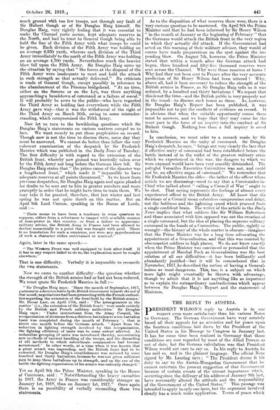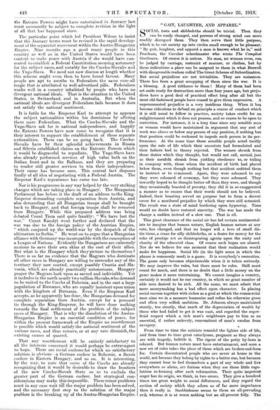THE REPLY TO AUSTRIA.
PREsmEgT WILSON'S reply to Austria is in one respect even more satisfactory than his various Notes to Germany. The German Government have very astutely based all their appeals for an armistice and for peace upon the fourteen conditions laid down by the President of the United States in his Message to Congress in January last. It has for some time been realized in Germany that those conditions are now regarded by most of the Allied Powers as out of date, but the German calculation was that President Wilson would not care to say so. In his reply to Austria he has said so, and in the plainest language. The official Note signed by Mr. Lansing says ; " The President deems it his duty to say to the Austro-Hungarian Government that he cannot entertain the present suggestion of that Government because of certain events of the utmost importance which, occurring since the delivery of his address of January 8th last, have necessarily altered the attitude and the responsibility Of the Government of the United States." This passage was intended to apply to only one issue, but the argument involved clearly has a much wider application. Terms of peace which the Entente Powers might have entertained in January last must necessarily be subject to complete revision in the light of all that has happened since.
The particular point which led President Wilson to insist that the January terms must be revised is the rapid develop- ment of the separatist movement within the Austro-Hungarian Empire. Nine months ago a good many people in this country as well as in the United States would have been content to make peace with Austria if she would have con- sented to establish a Federal Constitution securing autonomy for the subject races, and notably for the Czecho-Slovaks and the Yugo-Slays. e need not now discuss at length whether this scheme ought even then to have found favour. Many people are apt to ascribe to Federalism the same cure-all magic that is attributed to well-advertised pills. Federalism works well in a country inhabited by people who have no divergent national ideals. That is the situation in the United States, in Switzerland, and in Australia. But when the national ideals are divergent Federalism fails because it does not satisfy the national sentiment.
It is futile for the Emperor Karl to attempt to appease the subject nationalities within his dominions by offering them mere Federalism. What the Czecho-Slovaks and the Yugo-Slays ask for is national independence, and happily the Entente Powers have now come to recognize that it is their interest to support the establishment of these separate nationalities. There can be no going back. The Czecho- Slovaks have by their splendid achievements in Russia and Siberia established claims on the Entente Powers which it would be disgraceful to repudiate. The Yugo-Slays have also already performed services of high value both on the Italian front and in the Balkans, and they are preparing to render still greater services to win their independence. Their cause has become ours. This central fact disposes finally of all idea of negotiating with a Federal Austria. The Emperor Karl's repentance has come too late.
Nor is his programme in any way helped by the very striking changes which are taking place in Hungary. The Hungarian Parliament has before it the draft of an address to the King- Emperor demanding complete separation from Austria, and also demanding that all Hungarian troops shall be brought back to Hungary, and that foreiga troops shall be removed from Hungary. While this proposed address was being debated Count Tisza said quite frankly: " We have lost the war." Count Karolyi went further and declared that the war was due to the foreign policy of the Austrian Empire, " which conjured up the world-war by the despatch of the ultimatum to Serbia." He went on to argue that a Hungarian alliance with Germany was incompatible with the conception of a League of Nations. Evidently the Hungarians are extremely anxious to save their own skins at the cost of their allies. But what is the Hungary which they picture to themselves ? There is so far no evidence that the Magyars who dominate all other races in Hungary are willing to surrender any of the territory they now control, except possibly Croatia and Sla- vonia, which are already practically autonomous. Hungary proper the Magyars look upon as sacred and indivisible. Yet it includes in the north nearly two million Slovaks,who demand to be united to the Czechs of Bohemia, and in the east a large population of Rumanes, who are equally insistent upon union with the kingdom of Rumania. liven if the Emperor Karl accepts, as he apparently has done, the Hungarian demand for complete separation from Austria, except for a personal tie through the King-Emperor, he will have done nothing towards the final settlement of the problem of the subject races of Hungary. That is why the dissolution of the Austro- Hungarian Empire is an essential condition of peace, for within the present framework of the Empire no resettlement is possible which would satisfy the national sentiment of the various races, and thus remove, or at any rate diminish, the existing causes of quarrel.
That any resettlement will be entirely satisfactory to all the interests concerned it would perhaps be extravagant to hope. There are racial enclaves for which no satisfactory solution is obvious—a German enclave in Bohemia, a Saxon enclave in Eastern Hungary, and so on. It is interesting, by the way, to note that some of the Czechs are already recognizing that it would be desirable to draw the frontiers of the new Czecho-Slovak State so as to exclude the greater part of the German enclave, but strategical con- siderations may make this impossible. These minor problems must in any case wait till the major problem has been solved, and the necessary first step to the solution of the major problem is the brealing up of the Austro-11ungarian Empire.



































 Previous page
Previous page